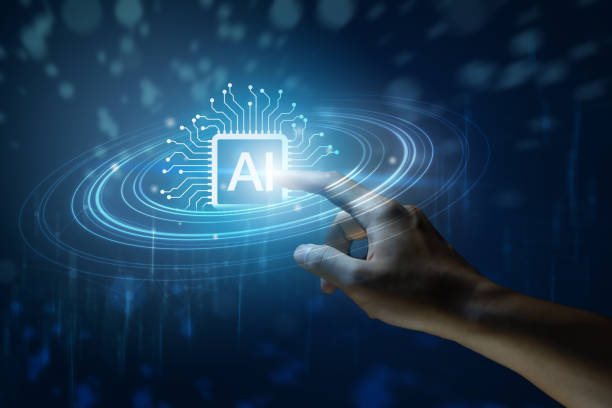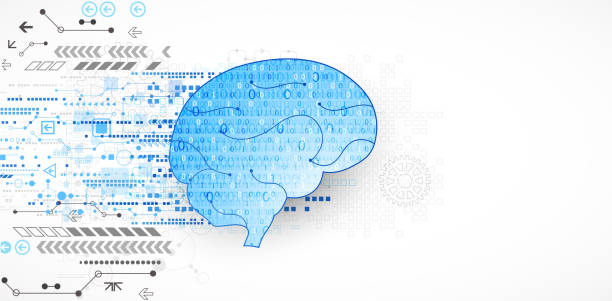What is Artificial Intelligence? Definition, History, and Key Concepts

Artificial Intelligence, or AI, in short, refers to the ability of a computer system to mimic human cognitive functions such as learning, problem-solving, and decision-making.
This broad field encompasses everything from simple systems that perform specific tasks (like email spam filters) to complex systems that can learn from data and improve their performance (like self-driving cars).
This revolutionary #technology has the potential to dramatically change various industries, from healthcare to finance and transportation.
Artificial intelligence seeks to simulate human thinking and reasoning in machines by using algorithms and various models.
The history of artificial intelligence dates back to the 1950s, when scientists and researchers began exploring the possibility of building machines that could think.
Alan Turing, one of the pioneers of this field, proposed the Turing Test, which is known as a benchmark for measuring the intelligence of machines.
Over the following decades, artificial intelligence faced many ups and downs.
There were periods of optimism and rapid progress, but also periods of disappointment and budget shortages.
However, recent advances in computing power, access to big data, and the development of machine learning algorithms have led to artificial intelligence re-emerging as a leading technology.
Key concepts in artificial intelligence include Machine Learning, Deep Learning, Neural Networks, Natural Language Processing, and Computer Vision.
Machine learning enables machines to learn from data and improve their performance without explicit programming.
Deep learning is a subset of machine learning that uses deep neural networks to analyze data.
Natural language processing allows machines to understand and produce human language.
Computer vision enables machines to understand and analyze images and videos.
Does your current company website not reflect your brand’s credibility and power as it should? Rasaweb solves this challenge for you with professional corporate website design.
✅ Increase the credibility and trust of visitors
✅ Attract more targeted customers
⚡ Click to receive free advice!
Types of Artificial Intelligence: From Expert Systems to Deep Learning

Artificial intelligence can be divided into different categories based on its capabilities and type of function.
One of these classifications is based on capabilities, which includes Narrow AI, General AI, and Super AI.
Narrow AI, which we see more of today, is designed to perform specific tasks and is specialized in that area.
Expert systems are an example of this type of artificial intelligence, which contains the knowledge of experts in a specific field and can act as an advisor.
General AI, which is still in the research stages, refers to a machine that can perform any task that a human performs, as well as or better than a human.
Achieving general artificial intelligence is a long-term goal for many researchers, but there are still many technical and ethical challenges along the way.
Super AI is beyond human intelligence and can surpass humans in all fields.
The existence of such intelligence can have many positive and negative consequences and requires careful consideration and foresight.
This is an important topic in artificial intelligence.
Based on the type of function, artificial intelligence can be divided into Rule-based Systems, Machine Learning Systems, and Deep Learning Systems.
Rule-based systems use a set of rules and instructions to make decisions.
Machine learning systems use data to learn patterns and relationships and can improve their performance without explicit programming.
Deep learning systems use deep neural networks to analyze data and have performed very well in areas such as computer vision and natural language processing.
Applications of Artificial Intelligence in Various Industries

Artificial intelligence is rapidly penetrating various industries and offers a variety of applications.
In the field of healthcare, artificial intelligence can play a role in disease diagnosis, development of new drugs, personalization of treatment, and improvement of patient care.
For example, machine learning algorithms can analyze medical images with high accuracy and detect early signs of diseases.
In the financial industry, artificial intelligence can play a role in fraud detection, risk management, providing financial consulting services, and automating processes.
For example, intelligent systems can identify suspicious patterns in financial transactions and prevent fraud.
In the transportation industry, artificial intelligence can play a role in the development of self-driving cars, optimizing transportation routes, and improving road safety.
Self-driving cars are an example of advanced artificial intelligence applications that can transform our lives.
In the retail industry, artificial intelligence can play a role in personalizing the shopping experience, predicting demand, optimizing the supply chain, and improving customer service.
For example, recommender systems can suggest related products to customers and increase the likelihood of purchase.
In addition to these industries, artificial intelligence has many applications in other fields such as education, agriculture, energy, and manufacturing, and it is expected that its role in these industries will become more prominent in the future.
| Industry | Application |
|---|---|
| Healthcare | Disease diagnosis, drug development |
| Finance | Fraud detection, risk management |
| Transportation | Self-driving cars, route optimization |
Machine Learning and Deep Learning: Differences and Applications

Machine learning and deep learning are two key concepts in the field of artificial intelligence that are often used interchangeably, but there are important differences between them.
Machine learning allows machines to learn from data and improve their performance without explicit programming.
In this method, algorithms are given to machines, and machines discover patterns and relationships by analyzing data.
Deep learning is a subset of machine learning that uses deep neural networks to analyze data.
Deep neural networks consist of multiple layers of nodes (neurons) that are connected to each other.
These networks can detect more complex patterns in the data and have performed very well in areas such as computer vision and natural language processing.
The main difference between machine learning and deep learning is in how features are extracted from the data.
In machine learning, it is usually necessary to manually extract the features related to the problem and provide them to the algorithm.
But in deep learning, neural networks automatically extract the relevant features from the data.
This feature makes deep learning perform better in problems where there is complex and structured data, such as images and sounds.
Are you losing potential customers due to an unprofessional website? Rasaweb is your answer! With our specialized corporate website design services:
✅ Enhance the credibility and standing of your business
✅ Experience attracting more targeted customers
⚡ Take action now to receive a free consultation!
Ethical and Social Challenges of Artificial Intelligence

The development and use of artificial intelligence bring important ethical and social challenges that require careful consideration and foresight.
One of these challenges is the issue of discrimination and injustice.
Artificial intelligence algorithms can make decisions that are discriminatory based on the data they are given.
For example, if a hiring algorithm is trained based on historical data in which men were more present in managerial positions, it may unconsciously favor men for these positions.
Another challenge is the issue of privacy and data security.
Artificial intelligence systems need a large amount of data to learn and improve their performance.
Collecting and using this data can raise concerns about the privacy of individuals.
Also, artificial intelligence systems can be the target of cyber attacks and their data can be stolen or manipulated.
The issue of job loss is another social challenge of artificial intelligence.
With the advancement of automation and robotics, many jobs currently performed by humans may be performed by machines in the future.
This can lead to increased unemployment and economic inequality.
To address these challenges, it is necessary to enact appropriate laws and regulations and provide the necessary training to individuals so that they can adapt to the changes caused by artificial intelligence.
The Future of Artificial Intelligence and its Impact on Our Lives

Artificial intelligence is advancing rapidly and is expected to have a profound impact on our lives in the future.
In the future, artificial intelligence can create major changes in various fields such as healthcare, education, transportation, and manufacturing.
For example, in the future, doctors may be able to diagnose diseases more accurately and provide more personalized treatments to patients using intelligent systems.
In the field of education, artificial intelligence can help teachers identify the learning needs of each student separately and design educational programs tailored to them.
In the field of transportation, self-driving cars can increase road safety and reduce traffic.
In the field of manufacturing, intelligent robots can automate production processes and increase productivity.
However, it should be noted that the advancement of artificial intelligence also brings challenges.
To harness the benefits of artificial intelligence and reduce its risks, it is necessary to take appropriate actions in the fields of education, legislation, and ethics.
Also, it should be noted that artificial intelligence is a tool that can be used for good or bad purposes.
Therefore, it is important to use this technology responsibly and ethically so that we can benefit from its advantages and reduce its risks.
Cybersecurity and Artificial Intelligence: Threats and Solutions

Artificial intelligence plays a dual role in cybersecurity, both as a defensive tool and as an offensive tool.
Cyber attackers can use artificial intelligence to automate attacks, identify vulnerabilities, and bypass security systems.
On the other hand, cybersecurity professionals can use artificial intelligence to identify threats, analyze data, and respond to attacks.
One of the important applications of artificial intelligence in cybersecurity is anomaly detection.
Intelligent systems can identify unusual patterns by analyzing network traffic and user behavior, which may indicate a cyber attack.
Also, artificial intelligence can play a role in analyzing malware and identifying its malicious features.
This helps cybersecurity professionals respond to threats faster and prevent damage.
To counter the cyber threats posed by artificial intelligence, we need to develop artificial intelligence-based defensive solutions.
These solutions must be able to identify and neutralize complex and automated attacks.
Also, cybersecurity professionals need to acquire the knowledge and skills necessary to use artificial intelligence.
Training and awareness-raising in the field of cybersecurity and artificial intelligence play an important role in reducing the risks posed by this technology.
| Security Threat | Artificial Intelligence Solution |
|---|---|
| Phishing Attacks | Identifying Suspicious Emails |
| Malware | Analyzing File Behavior |
| Network Intrusion | Identifying Unusual Traffic |
The Role of Governments and Organizations in the Development and Regulation of Artificial Intelligence

Governments and organizations play an important role in the development and regulation of artificial intelligence.
Governments can help develop this technology by investing in artificial intelligence research and development, creating the necessary infrastructure, and developing ethical standards.
Also, governments can prevent the misuse of artificial intelligence and protect the rights and privacy of individuals by enacting appropriate laws and regulations.
Organizations can also help shape a sustainable and reliable artificial intelligence ecosystem by adopting responsible and ethical approaches in the development and use of artificial intelligence.
Organizations should pay attention to transparency, accountability, and fairness in the use of artificial intelligence algorithms and prevent discrimination and injustice.
Cooperation between governments, organizations, researchers, and civil society is essential for the development and regulation of artificial intelligence.
This cooperation can help create a comprehensive and coordinated framework for managing risks and exploiting the benefits of artificial intelligence.
Also, the exchange of information and experiences between different stakeholders can help improve understanding and awareness of artificial intelligence and prevent incorrect decisions.
Does your current website convert visitors into customers or drive them away? Solve this problem forever with professional corporate website design by Rasaweb!
✅ Create a strong brand and credibility
✅ Attract targeted customers and increase sales
⚡ Get a free consultation now!
Artificial Intelligence Training for Non-Experts: An Easy Start

Learning artificial intelligence is no longer just for experts.
There are many resources available to help non-experts get acquainted with the concepts and applications of artificial intelligence.
Online courses, books, blogs, and workshops are among these resources.
Using these resources, you can learn the basics of machine learning, deep learning, and other areas related to artificial intelligence.
One of the easiest ways to start learning artificial intelligence is to use No-Code tools.
These tools allow you to build and test artificial intelligence models without writing code.
Using these tools, you can quickly and easily implement the applications of artificial intelligence in your projects.
In addition to theoretical learning, practical exercise is also essential for learning artificial intelligence.
By doing small and simple projects, you can apply theoretical concepts in practice and strengthen your skills.
Also, participating in artificial intelligence forums and online groups can help you connect with other enthusiasts and experts in this field and learn from their experiences.
Useful Resources and Tools for Learning and Developing Artificial Intelligence

There are many resources and tools available for learning and developing artificial intelligence.
Online learning platforms such as Coursera (Coursera), Udemy (Udemy), and edX (edX) offer a variety of training courses in the field of artificial intelligence.
These courses are taught by prominent university professors and industry experts and help you acquire the concepts and skills necessary to work in the field of artificial intelligence.
Software libraries such as TensorFlow (TensorFlow), PyTorch (PyTorch), and Scikit-learn (Scikit-learn) are powerful tools that allow you to build and train artificial intelligence models quickly and easily.
These libraries have a set of algorithms, functions, and helper tools that help you implement your artificial intelligence projects in the best possible way.
In addition to these resources, there are other online tools that help you analyze data, visualize artificial intelligence models, and share your results.
Google Colab (Google Colab) is an online development environment that allows you to run Python code for free and use artificial intelligence libraries.
Kaggle (Kaggle) is an online platform that hosts artificial intelligence competitions and allows you to compete with other experts in this field and improve your skills.
Using these resources and tools, you can become an artificial intelligence expert and find a high-paying and challenging job in this field.
This was an overview of artificial intelligence.
Frequently Asked Questions
| Question | Answer |
|---|---|
| 1. What is Artificial Intelligence (AI)? | It is a branch of computer science that aims to create machines capable of simulating human intelligence and performing tasks that require human thinking, such as learning, problem-solving, and decision-making. |
| 2. What are the main types of artificial intelligence? | They can be classified into weak artificial intelligence (Narrow AI) that focuses on a specific task, general artificial intelligence (General AI) that possesses comprehensive human capabilities, and super artificial intelligence (Super AI) that surpasses human intelligence. |
| 3. Mention some common artificial intelligence applications in our daily lives. | They include voice assistants (such as Siri and Alexa), recommendation systems (such as Netflix and Amazon), self-driving cars, facial recognition systems, and spam filters. |
| 4. What is the difference between artificial intelligence and machine learning? | Artificial intelligence is the broader concept of creating intelligent machines, while machine learning is a subset of artificial intelligence that focuses on enabling systems to learn from data without explicit programming. |
| 5. What is Deep Learning? | It is a subset of machine learning that uses multi-layered artificial neural networks (deep neural networks) to process data and discover complex patterns, and is used in image and speech recognition. |
| 6. What are the most prominent benefits of artificial intelligence? | Improving efficiency and productivity, automating repetitive tasks, making better decisions based on the analysis of big data, and developing solutions to complex problems in fields such as medicine and science. |
| 7. What are the main challenges facing the development and deployment of artificial intelligence? | They include the need for vast amounts of high-quality data, privacy and security issues, bias in data and algorithms, and high development and maintenance costs. |
| 8. Does artificial intelligence raise ethical or social concerns? | Yes, it raises concerns about privacy, algorithmic bias, job loss due to automation, responsibility for errors made by intelligent systems, and the need for a regulatory framework. |
| 9. How can artificial intelligence affect the future of the labor market? | It can lead to the automation of some routine tasks, but it will also create new jobs that require advanced skills in developing, operating, and maintaining artificial intelligence systems. |
| 10. What are some modern or promising technologies in the field of artificial intelligence? | They include advanced natural language processing (NLP) (such as large language models like ChatGPT), computer vision, robotics, and generative AI. |
And other services of Rasa Web Advertising Agency in the field of advertising
Intelligent Reporting: A creative platform to improve website traffic with marketing automation.
Intelligent Direct Marketing: A creative platform to improve online growth with intelligent data analysis.
Intelligent Marketplace: A fast and efficient solution to increase website traffic by focusing on intelligent data analysis.
Intelligent Sales Automation: A professional solution to increase click-through rate by focusing on the use of real data.
Intelligent UI/UX: Professional optimization for managing campaigns using custom programming.
And more than hundreds of other services in the field of internet advertising, advertising consulting, and organizational solutions
Internet Advertising | Advertising Strategy | Reportage Ad
Resources
What is Artificial Intelligence? Types and Applications
,What is Artificial Intelligence (AI)? All about it – TechTarget
,Artificial Intelligence (AI) – IBM
,Artificial Intelligence – Wikipedia
? Is your business ready to leap into the digital future? Rasa Web Digital Marketing Agency, by offering comprehensive services including modern user interface website design, SEO, and social media management, paves the way for your success. Contact us today and transform the future of your brand.
📍 Tehran, Mirdamad Street, next to Central Bank, Southern Kazerun Alley, Ramin Alley No. 6




